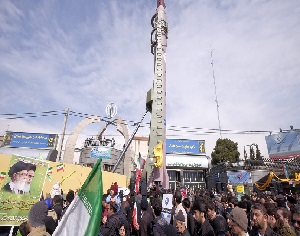Image: Iranian-made Emad missile is displayed during a ceremony marking the 37th anniversary of the Islamic Revolution, in Tehran February 11, 2016. REUTERS/Raheb Homavandi
![]()
By Bozorgmehr Sharafedin and Doina Chiacu
DUBAI/WASHINGTON (Reuters) – Iran’s Islamic Revolutionary Guards Corps (IRGC) test-fired several ballistic missiles on Tuesday, state television said, challenging a United Nations resolution and drawing a threat of a diplomatic response from the United States.
Two months ago, Washington imposed sanctions against businesses and individuals linked to Iran’s missile programme over a test of the medium-range Emad missile carried out in October 2015.
U.S. State Department spokesman Mark Toner said Washington would review the incident and, if it is confirmed, raise it in the U.N. Security Council and seek an “appropriate response”.
“We also continue to aggressively apply our unilateral tools to counter threats from Iran’s missile program,” Toner added, in a possible reference to additional U.S. sanctions.
An Iranian state television report showed a missile being fired from a fortified underground silo at night time. The presenter said it was a medium-range Qiam-1 missile, and the test took place in the early hours of Tuesday.
The report said the Guards had fired several missiles from silos across the country, though it only showed footage of one. “The missiles struck a target 700 km away,” said Brigadier General Amir Ali Hajizadeh, commander of the IRGC’s aerospace arm.
State-run Press TV had earlier shown footage of the Emad missile, Iran’s most advanced model under development, being fired. However, that footage appeared to be of the earlier October launch that triggered the U.S. sanctions.
U.S. and French officials said a missile test by Iran would violate U.N. Security Council resolution 2231, which calls on Iran not to conduct “any activity” related to ballistic missiles capable of delivering nuclear weapons.
However, Washington said that a fresh missile test would not violate the Iran nuclear deal itself, under which Tehran agreed to restrict its atomic program in exchange for relief from economic sanctions. The deal was endorsed in resolution 2231.
It is unlikely the Security Council would take action on Iranian missile tests, diplomats say.
While most of its 15 members would agree with the United States and France about a likely violation of resolution 2231, Russia and China, which have veto power, made clear during negotiations on the Iran nuclear deal they did not agree with continuing the U.N. restrictions on Tehran’s missile program and arms trade.
DETERRENT POWER
Hajizadeh said sanctions would not stop Iran developing its ballistic missiles, which it regards as a cornerstone of its conventional deterrent.
“Our main enemies are imposing new sanctions on Iran to weaken our missile capabilities … But they should know that the children of the Iranian nation in the Revolutionary Guards and other armed forces refuse to bow to their excessive demands,” the IRGC’s website quoted Hajizadeh as saying.
Iran always denied any link between its ballistic missiles and its disputed nuclear programme, which is now subject to strict limitations and checks under the nuclear deal.
Tuesday’s test is intended “to show Iran’s deterrent power and also the Islamic Republic’s ability to confront any threat against the (Islamic) Revolution, the state and the sovereignty of the country”, the IRGC’s official website said.
While any missile of a certain size could in theory be used to carry a nuclear warhead, Iran says the Emad and other missiles are for use as a conventional deterrent. Recent work has focused on improving the missiles’ accuracy, which experts say will make them more effective with conventional warheads.
(Reporting by Bozorgmehr Sharafedin in Dubai, Doina Chiacu and Arshad Mohammed and Andrea Shalal in Washington, John Irish in Paris and Lou Charbonneau at the United Nations; Writing by Sam Wilkin; Editing by Gareth Jones and Alistair Bell)
Copyright 2015 Thomson Reuters. Click for Restrictions.
Iran-fires-ballistic-missiles-U-S-hints-at-diplomatic-response-media.jpg


